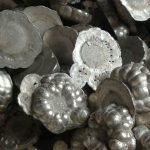Notice: Undefined index: sith_hide_share in /www/sites/alloy.wiki/index/wp-content/themes/likegoogle/single.php on line 32
Deprecated: get_settings is deprecated since version 2.1.0! Use get_option() instead. in /www/sites/alloy.wiki/index/wp-includes/functions.php on line 4862
Industrial pure titanium bar TA1, TA2 and TA3:
The titanium bar has excellent stamping performance. Various forms of welding can be carried out, welding performance is good, welding joint up to 90% of the matrix strength. Easy to cut with saw and grinding wheel, good machining performance. Excellent corrosion resistance for parts under 350℃, small force and stamping into a variety of complex shapes. Such as power plant condenser; Marine seawater corroded piping systems, valves and pumps; Chemical heat exchanger, pump body, distillation column; Seawater desalination system, platinum-plated anode; Skeleton, skin, engine parts, beams, etc.
Commonly used brands and USES of titanium alloys
Titanium alloy TA6:
It has good welding performance, high creep strength, but low process plasticity, and can be deformed in thermal state. When dongri alloy bears axial load, it has no sensitivity to notch, and its cutting performance is still better for parts and welds working under 400 ℃.
Titanium alloy TA7:
Poor stamping performance, thermoplastic is good. Dongri can be used for various types of welding, good performance, welding joint strength and plasticity can be equal to the base metal. Mechanical processing performance and industrial pure titanium is the same. Good corrosion resistance, good high temperature thermal stability to do long-term work below 500℃ structural parts, can do all kinds of die forging parts.
Titanium alloy TA8:
Good thermoplasticity. All kinds of welding can be done in east Japan with good weldability. The machinability is the same as that of industrial pure titanium. Good oxidation resistance for long-term working parts below 500℃. Dongri can make engine compressor discs and blades.
Titanium alloy TC1:
Good stamping performance. All kinds of welding can be done in east Japan with good weldability. The machinability is the same as that of industrial pure titanium. Good oxidation resistance to work under 400℃ parts. Suitable for various sheet, stamping and welding parts.
Titanium alloy TC2:
At 350℃, the lasting strength of 100h is over 400MPa, and the hot working has good plasticity. Heating to 350-400℃, no tendency to brittle, therefore, it can be used to weld the parts in the high temperature work under 500℃ work parts, welding parts, die forging parts and bending parts.
Titanium alloy TC3:
Poor stamping, good thermoplastic. Various forms of welding can be carried out, welding joint strength up to 90% of the strength of the matrix metal. Mechanical processing performance is still good, need to use carbide, large tool, slow, full cooling. Good corrosion resistance and thermal stability. Dongri metal is one of the most widely used titanium alloys to do long-term work below 400 ℃ parts.
Titanium alloy TC4:
The composition of the material is ti-6al-4v, which belongs to (a+b) type titanium alloy and has good comprehensive mechanical properties. Greater than the intensity. The strength sb of TC4 = 1.012mpa, the density g=4.4*103, the specific strength sb/g=23.5, while the specific strength sb/g of alloy steel is less than 18. The thermal conductivity of titanium alloy is low. The thermal conductivity of titanium alloy is 1/5 of that of iron, 1/10 of that of aluminum, and the thermal conductivity of TC4 l=7.955W/m·K. Linear expansion coefficient =7.89*10-6 ℃, specific heat =0.612 CAL /g ·℃. The elastic modulus of titanium alloy is low. The elastic modulus of TC4 E=110GPa is about 1/2 of that of steel, so it is easy to produce deformation during the processing of titanium alloy. TC4 (Ti 6 al 4 v) and TA7 titanium alloy (al Ti – 5-2.5 Sn), use two injection methods for the surface modification, the test shows that the titanium alloy after ion implantation, improves the microhardness, significantly reduce the sliding friction coefficient, wear resistance is improved effectively. The modification mechanism is proven, injection and injection sample for the X-ray photoelectron spectroscopy (XPS) analysis, to obtain satisfactory results. The TC4 titanium alloy has excellent corrosion resistance, small density, high specific strength and good toughness and weldability and a series of advantages, In the aerospace, petrochemical, shipbuilding, automotive, mold, medicine and other sectors have been successful applications.
Titanium alloy TC5:
It is stable below 350 and declines plastically at higher temperatures. Parts that can be forged, stamped and deformed under 350℃ under the thermal condition.
Titanium alloy TC9:
Thermoplasticity is good. The machinability is the same as that of T alloy. High corrosion resistance. Thermal stability is good below 400℃ long – term working parts. Can make compressor disc and blade.
Titanium alloy TC10:
Poor stamping, good thermoplastic. Dongri can carry out various forms of welding, welding joint strength up to 90% of the strength of the matrix metal. The mechanical properties are the same as those of T alloy. Good corrosion resistance. The thermal stability is good, the heat treatment effect is significant, hardenability is good to do long-term work below 450℃ parts.
Guest contributors are welcome at the Alloy Wiki.It is a weekly wiki and guide on alloy information and processing technology, while also about the vast array of opportunities that are present in manufacturing. Our team of writers consists of a Machining Material Supplier / Machinist / Tool and Die Maker, a Biomedical Engineer / Product Development Engineer, a Job Development Coordinator / Adjunct Professor, and a President and CEO of a manufacturing facility.
Link to this article:The commonly used brands of titanium alloy bars and titanium alloy forgings and their application fields
Reprint Statement: If there are no special instructions, all articles on this site are original. Please indicate the source for reprinting:Alloy Wiki,thanks!^^


